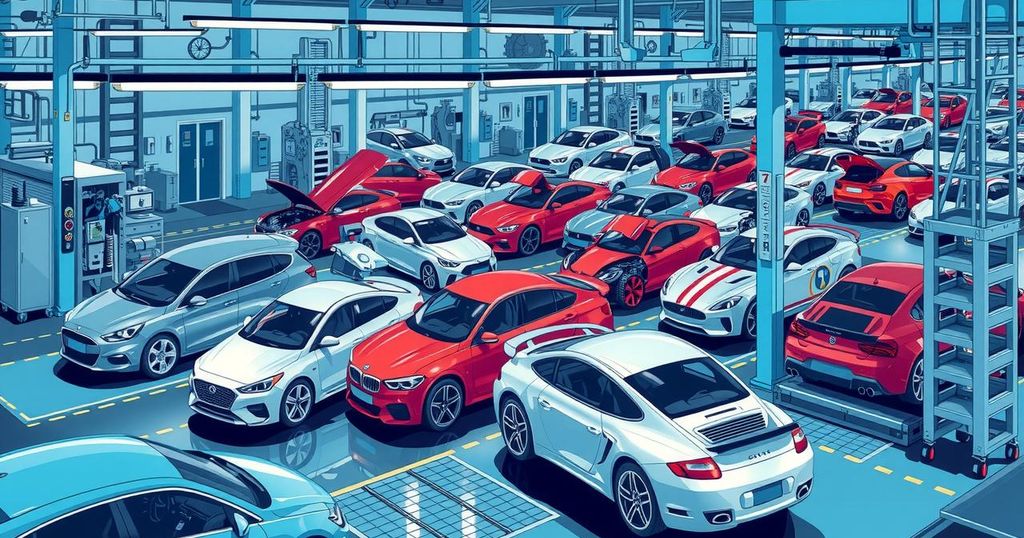Impact of Trump’s Proposed Tariffs on Japanese Automakers and the Economy

Japanese automakers, initially hopeful under Trump, now face threatening tariffs on imported cars that could severely impact their profits and Japan’s economy. This article discusses the emerging anxiety within the industry, the history of U.S.-Japan relations regarding tariffs, and how companies are preparing for potential losses while lobbying against stricter trade policies.
Japanese automakers, once optimistic about President Trump’s policies, are now facing significant threats from potential U.S. tariffs on foreign-made vehicles. Before the election, companies like Toyota anticipated a second Trump term would favor their interests, especially given Trump’s stance against restrictive environmental policies on the auto sector. In fact, Toyota invested heavily in pro-Trump initiatives, contributing $1 million to his inauguration.
However, initial optimism has dwindled as the Trump administration moved to impose 25% tariffs on imports from Mexico and Canada, where many Japanese vehicles are assembled. With an announcement expected regarding further tariffs targeting countries, including Japan, the Japanese auto industry braces for adverse economic impacts that could severely affect automakers’ profits and the overall Japanese economy.
Japan is a leading exporter of automobiles, with the U.S. being its largest market. Analysts predict that the proposed tariffs could reduce Japan’s GDP growth by 0.2% in 2023, which would be substantial given the country’s low potential growth of around 0.5%. Consequently, manufacturers like Toyota, Honda, and Nissan are preparing for a significant economic blow as they examine their production and sales strategies in the U.S.
Once considered allies, the relationship between President Trump and Japanese automakers has been contentious, with historical criticisms of Japan’s automotive industry dating back to the 1980s. While Japan initially thwarted tariffs during Trump’s first term, the re-emergence of these threats has caused concern. Toyota had once confidently planned substantial investments in the U.S.; however, the changing landscape, including Trump’s newfound support for electric vehicles, has compounded uncertainties.
Concerns about slow electric vehicle adoption have been addressed by Japanese companies, with Toyota advocating for consumer-driven markets. They continue to lobby against stricter regulations that could hasten the transition to electric vehicles in favor of hybrids, which are currently the company’s focus. Recent internal meetings revealed that Toyota leaders expressed confidence in holding onto their stance against aggressive electric vehicle mandates.
Japanese dealerships are already feeling the strain, as seen in Maine where sales have plummeted. The looming tariffs have led to decreased consumer confidence, with auto sales dropping significantly. With about 1 million of the 2.3 million cars sold in the U.S. last year coming from overseas, Japanese companies are highly exposed to potential tariff impacts.
Responding to the threat, Japanese automakers are increasing shipping volumes to the U.S. and optimizing their local production capabilities. Despite Toyota’s longstanding investment of over $50 billion in the U.S. market and the creation of substantial local jobs, the industry remains on edge as negotiations and lobbying efforts for tariff exemptions continue without definitive outcomes.
With insufficient excess production capacity, Japanese automakers face challenges in expanding operations in the U.S. Building new factories takes years and considerable investment, which companies are reluctant to commit amidst ongoing trade uncertainties. In light of this unstable environment, companies are cautious about making long-term financial commitments without guaranteed market stability.
In summary, the potential for new tariffs on Japanese automobiles under the Trump administration poses significant challenges for Japan’s auto industry. Previous optimism has turned into concern as tariffs are likely to impact profits and economic growth. Japanese automakers are adapting by increasing shipments and examining local production, although long-term decisions remain uncertain amidst the looming threat of tariffs. These developments underscore the fragility of international trade relations and economic stability in the auto sector.
Original Source: www.nytimes.com





